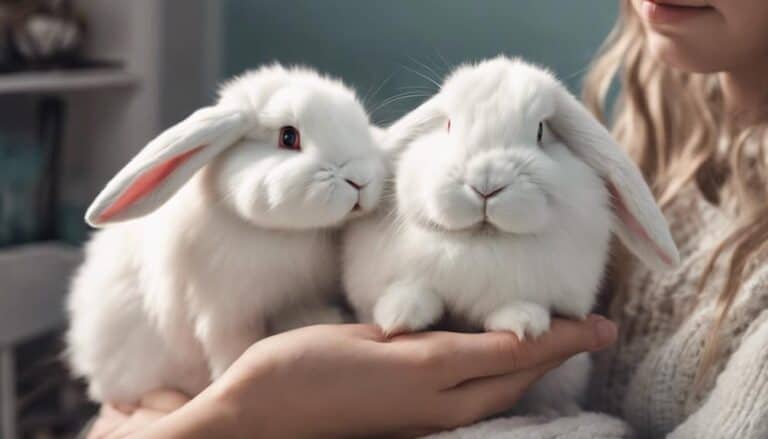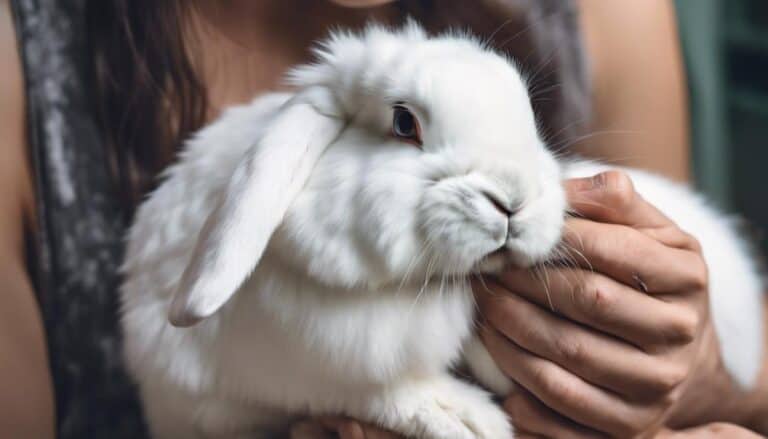To take good care of bunnies, give them plenty of space to hop around and cozy hiding spots. Make sure to use soft bedding and gentle flooring in a clean area. Provide hay for digestion and limit the amount of pellets you give them. It's also important to offer fresh veggies and water for hydration.
Pay attention to your bunnies' body language and social cues to ensure they are happy and healthy. Take them for yearly vet check-ups, vaccinations, and make sure they get enough exercise. Socializing them is important for their mental well-being, and introducing companions can make them even happier.
Regular grooming, nail trims, and providing companionship are essential for your bunnies' well-being. Handle them gently, build trust, and seek professional advice when it comes to nail care. By following these practices, you'll have happy and healthy bunnies in your care.
Contents
Key Takeaways
Make sure your bunny has plenty of room to hop around and find cozy spots to hide. It's important to create a safe environment where they can feel comfortable and secure.
When it comes to their diet, offer a good balance of hay, a small amount of pellets, and fresh veggies. This will keep them healthy and happy.
It's also a good idea to learn about your rabbit's behavior cues. This will help you understand their needs and ensure they are content.
Don't forget to schedule yearly check-ups with the vet to make sure your bunny is in good health. And if you notice any concerning symptoms, don't hesitate to seek immediate care.
Rabbits are social creatures, so make sure to provide companionship and opportunities for bonding. This will help them thrive and lead a happy life.
Suitable Environment for Bunnies
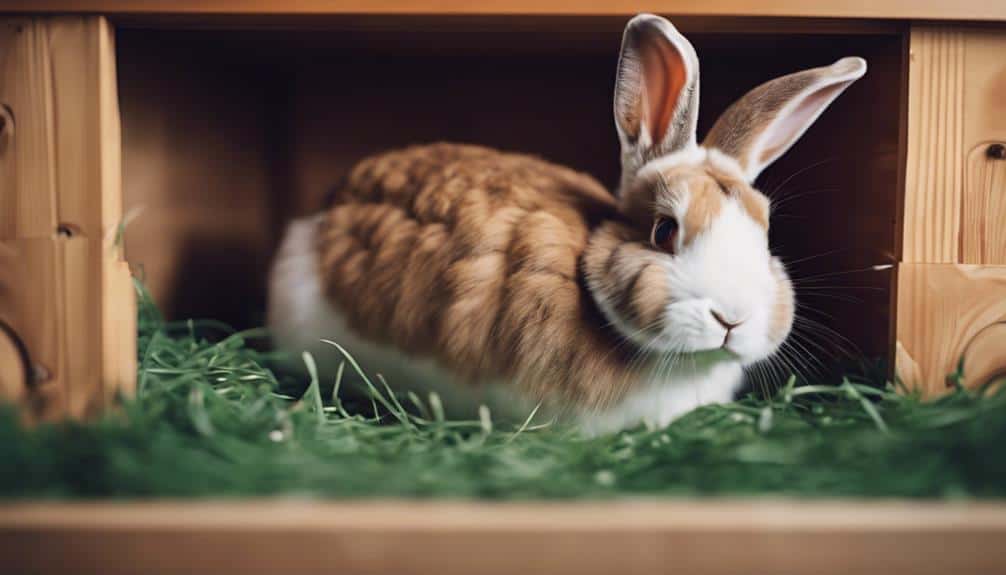
When you set up a home for your bunnies, make sure it's spacious so they can hop and run around. Bunnies love having room to move freely. Keep the space safe from any potential dangers like predators or bad weather. Add cozy hiding spots for them to feel secure and comfy. Use soft bedding for them to rest on.
If your bunnies are indoors, choose flooring that's gentle on their delicate feet. It's important to keep their space clean to keep them healthy. For outdoor areas, make sure they're secure so your bunnies can't escape or get into trouble. By focusing on these things, you'll create a happy and healthy environment for your bunnies to thrive in.
Balanced Nutrition for Bunnies
If you want your bunnies to be healthy and happy, make sure they eat a lot of hay. Hay is essential for their digestion and to keep their teeth in good shape. It should be the main part of their diet. Only give them a small amount of commercial pellets, no more than 10% of their daily food.
It's also a good idea to give them some fresh veggies and fruits now and then. But don't overdo it. Give them a mix of leafy greens like kale, spinach, and cilantro. When it comes to fruits, stick to apples and berries in moderation because they've sugar.
Avoid feeding your rabbit foods that are high in sugar, carbs, and fat. These can cause health issues. Always make sure your bunny has plenty of clean water to drink. This helps to keep them hydrated and healthy.
Understanding Rabbit Behavior
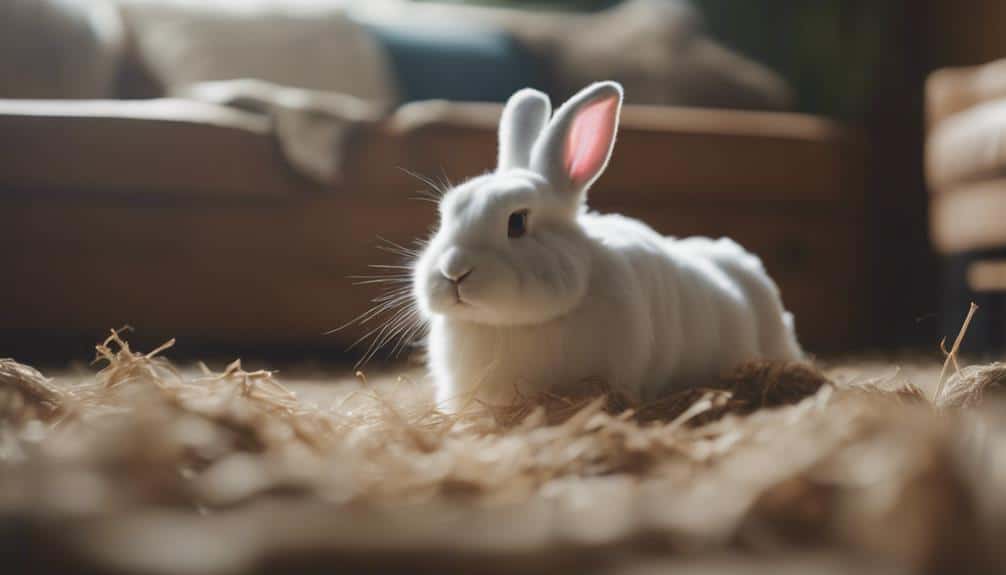
If you want to make sure your rabbit is happy and healthy, it's important to understand how they communicate and interact with others. By learning how to read their body language and social cues, you can create a more comfortable environment for your fluffy companion. Paying attention to signs of stress, fear, and contentment can help you better care for your rabbit and strengthen your bond with them.
When you observe your rabbit's behaviors and reactions, you can gain insight into how they're feeling. For example, if your rabbit is thumping their foot or hiding, they may be stressed or scared. On the other hand, if they're relaxed and flopped over, they're likely feeling content and safe in their surroundings.
Body Language Signals
Understanding rabbit behavior means looking at how they use their body to communicate.
For example, when a rabbit tucks its ears tightly against its body, it might mean it's scared or feeling aggressive. On the other hand, a relaxed rabbit will have its ears in a normal position and look comfortable.
If a rabbit starts thumping its hind legs on the ground, it could be a sign of danger or stress. Paying attention to the position of their tail, how they groom themselves, and any sounds they make can also give you clues about how they're feeling.
Social Interaction Patterns
If you want to understand rabbits better and how they communicate, just watch how they interact with each other. Rabbits are social creatures that need companionship to thrive.
To really get rabbit behavior, you have to be able to read their body language signals that show they want to connect with others. It's crucial to socialize rabbits early on so they can build confidence and trust not just with other rabbits, but with people too.
Setting up an environment that encourages social interaction can really boost a rabbit's overall well-being. By meeting their social needs and giving them chances to bond, you can ensure your rabbits live happy and satisfying lives.
Veterinary Care for Bunnies
Taking care of your bunny means making sure they see the vet regularly. Yearly check-ups are super important to catch any problems early on.
Find a good vet who can give you tips on keeping your bunny healthy and help with any issues that pop up.
Bunny Health Check
Regular vet check-ups are super important for keeping your bunny healthy. During these visits, the vet will check on a few key things to make sure your bunny is doing well.
First up, vaccinations. It's crucial to make sure your bunny gets their annual shots to prevent diseases like Myxomatosis and RHDV. These shots can help keep your little buddy safe and healthy.
Grooming is another big deal. Make sure to brush your bunny regularly, trim their nails, and have their teeth checked. This helps keep them looking and feeling their best.
Monitoring your bunny's weight is also key. Keeping an eye on their weight can give you a good idea of their overall health. If you notice any big changes, it's a good idea to chat with your vet.
If your bunny starts acting differently or shows signs of being sick, don't wait around. Get in touch with your vet right away. It's always better to be safe than sorry when it comes to your furry friend's health.
And last but not least, daily exercise is important for keeping your bunny in tip-top shape. Encourage them to hop around and play to help prevent obesity and keep them feeling great.
Preventive Care Tips
Taking care of your bunny's health is super important. That means taking them to the vet for regular check-ups and vaccinations every year. These vaccinations are a must to protect your rabbit from serious diseases like Myxomatosis and Rabbit Haemorrhagic Disease Virus (RHDV).
Regular check-ups with the vet help keep an eye on your bunny's overall health. For female rabbits, it's a good idea to get them spayed to prevent uterine diseases. And for males, neutering can help reduce aggression and reproductive issues.
Don't forget about parasite control! Keeping your bunny safe from ear mites, fur mites, fleas, and flystrike is crucial. If you notice any signs of ear or fur mites, make sure to see the vet right away for the best treatment and care.
Finding a Vet
To keep your bunny healthy, it's important to find a vet who knows how to treat rabbits. Here's what to consider when looking for a rabbit vet:
First, make sure the vet is familiar with common health issues in rabbits and knows how to prevent them. This will help keep your bunny in good shape.
Next, choose a vet who's good at handling and examining rabbits. This will help reduce stress on your pet during visits.
Make sure the vet has the right equipment for diagnosing your rabbit accurately. This is important for getting the right treatment.
It's also a good idea to find a vet who offers emergency services. You'll want quick care if your bunny has a health emergency.
Lastly, pick an experienced vet who can treat your rabbit effectively while keeping stress to a minimum. Your furry friend's comfort is important too.
Social Interaction for Bunnies
When you're taking care of bunnies, it's important to think about their social needs because it really affects how happy and well they are. Bunnies are social creatures, so they do best when they've a buddy or a group of friends to hang out with. It helps them avoid feeling lonely and keeps them mentally healthy. Neutered pairs or groups of bunnies can live together peacefully without worrying about unexpected baby bunnies, allowing them to focus on building strong friendships. Bunnies that are bonded usually get along really well and form deep connections with each other.
If you're bringing in new bunnies, make sure to do it slowly and carefully to help them become friends without any issues. By giving them chances to socialize and making sure they've companionship, you're making a big difference in their happiness and overall well-being. Just remember, a happy bunny is often one that gets to hang out with others.
Grooming and Handling Bunnies
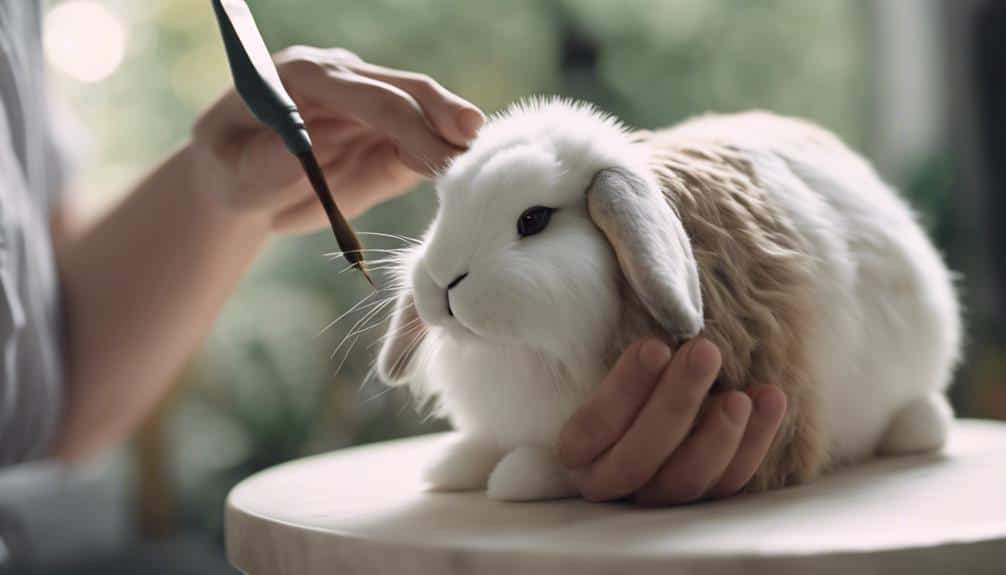
Bunnies are social animals and they need companionship to stay healthy and happy. So, it's important to take good care of them through proper grooming and handling. Here are some tips to keep your bunny in top shape:
First off, regular grooming is a must, especially for long-haired bunnies. This helps prevent their fur from getting all tangled up and keeps their coat healthy. Grab a soft brush or comb and gently groom your bunny to remove any loose fur and avoid hairballs.
When handling your bunny, be gentle and careful. Support their body and avoid any sudden movements. This helps build trust with your bunny and keeps them from getting stressed out.
Don't forget to check your bunny's nails regularly. If they get too long, trim them carefully to prevent any discomfort or potential injuries.
And lastly, if you notice any changes in your bunny's grooming habits or appearance, it's always a good idea to consult a vet for professional advice. They can help you with any grooming issues and make sure your bunny stays healthy and happy.
Importance of Companionship for Bunnies
Having a buddy is super important for bunnies' happiness and well-being. They really thrive when they've another rabbit friend around. When bunnies are spayed or neutered, they can live together peacefully, which helps prevent them from feeling lonely and gives them a sense of security. Bunnies who are bonded usually get along well, they don't fight much, and they provide each other with comfort and companionship. This is really good for their overall happiness.
When you're introducing a new rabbit to your group, make sure to take it slow and be careful. This will help the bunnies adjust smoothly and avoid any conflicts. It's all about creating a positive and safe environment for them to socialize and play together.
To keep your bunnies entertained and happy, it's important to give them toys and activities that stimulate their natural behaviors. This helps prevent boredom and strengthens the bond between them. By setting up a fun and engaging environment for your bunnies, you can ensure they've a fulfilling and emotionally satisfying life.
Frequently Asked Questions
Are Bunnies Easy to Take Care Of?
Taking care of bunnies is pretty simple once you know what they need. First off, make sure you're feeding them the right stuff, giving them enough space to hop around, and keeping them clean with regular grooming. Keep an eye on their behavior, set up a comfy home for them, make sure they stay healthy, and spend time with them to keep them happy.
It's important to give your bunnies a balanced diet with hay, veggies, and pellets. Also, let them out for exercise every day so they can stretch their legs and stay in shape. And don't forget to brush them to keep their fur nice and tidy.
Watching how your bunnies act can tell you a lot about how they're feeling. If they're acting off, it might be a sign that something's wrong. And make sure their living space is cozy and safe with plenty of room to move and hide if they want to.
Regular check-ups with a vet are crucial to keep your bunnies healthy. They'll need to see the vet for vaccinations, check-ups, and if they get sick. And don't forget to spend time with them and give them toys to play with for mental stimulation.
Training your bunnies can help them learn good behaviors and keep them entertained. And adding some fun activities and new things to explore in their environment can keep them happy and engaged. So, make sure to show your bunnies some love and attention to keep them hopping with joy!
How Do You Take Care of a Bunny for Beginners?
If you're new to taking care of a bunny, make sure to give them a good mix of fresh hay and veggies in their diet. They need space to hop around and play, so set up an area where they can stretch their legs. When you groom them, be gentle to help them trust you more. Also, bunny-proof your home to keep them safe from any hazards.
Bunnies enjoy having company, so think about introducing them to other bunnies for socializing. And don't forget to take them to the vet regularly for check-ups to keep them healthy and happy.
Do Rabbits Like to Be Cuddled?
Rabbits have their own preferences when it comes to cuddling. Most of them enjoy gentle petting and sitting close to you. However, they may not appreciate being picked up or restrained. It's important to pay attention to their body language to see how comfortable they are.
How Do You Take Care of an Indoor Rabbit?
Taking care of an indoor rabbit involves a few key things. You'll want to make sure they're litter trained, have plenty of space inside, eat a balanced diet, get regular exercise, stay groomed, socialize well, and keep areas bunny-proofed. It's also important to play with them, schedule vet check-ups, and bond with your bunny.
First off, it's essential to teach your rabbit to use a litter box. This helps keep their living area clean and makes your life easier. Make sure they have enough indoor space to move around comfortably. Rabbits need room to hop and explore, so a spacious environment is best.
When it comes to food, make sure your rabbit has a balanced diet. This includes hay, vegetables, and pellets. Avoid giving them too many treats, as this can lead to health issues. Regular exercise is also crucial for a happy and healthy rabbit. You can let them roam in a safe, bunny-proofed area or set up a playpen for them to hop around in.
Grooming is another important aspect of rabbit care. Brush their fur regularly to prevent mats and keep them clean. Socialization is key for rabbits, so spend time with them every day. This can include gentle petting, talking to them, or even teaching them tricks.
To prevent any accidents, make sure to bunny-proof your home. This means removing any potential hazards like wires or toxic plants. Playtime is essential for rabbits, so provide them with toys and engage in interactive activities with them.
Regular vet check-ups are important to keep your rabbit healthy. Schedule appointments for vaccinations and check-ups to catch any issues early. Finally, bonding with your rabbit is crucial for building a strong relationship. Spend quality time with them, offer treats, and show them love and affection.
Conclusion
Taking care of bunnies involves various aspects such as providing the right environment, good food, understanding their behavior, and regular vet visits. Socializing, grooming, and companionship are also important for their well-being.
Fun fact: rabbits love being around other bunnies, so having a buddy or two can make them really happy. Remember, happy bunnies are healthy bunnies!



